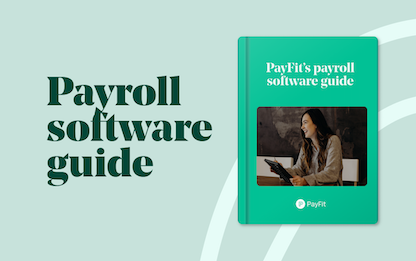- Blog
- |Managing Payroll
- >Payroll
- >a guide to payroll outsourcing
Payroll Outsourcing: Everything You Need to Know


Outsourcing payroll is just one of several ways you can manage your payroll.
In fact, many companies across the UK have turned to outsourcing to manage manual business tasks they find unpleasant or too laborious to maintain internally. The premise is pretty simple - you gather the information, then send it away to an external payroll specialist or financial provider like your accountant, and they take care of the rest.
But while these services are designed to help you win back time, they have a few key disadvantages. To help you understand what payroll outsourcing services are, we’ve put together this comprehensive guide on all things payroll outsourcing - from what it is and the advantages and disadvantages of using these services to the costs involved. We’ll also touch on one alternative to using these services that might be more cost effective and efficient for certain companies.
What is payroll outsourcing?
Payroll outsourcing is simply getting someone else - like an accountant or payroll bureau - to do your payroll for you. In other words, you delegate or subcontract your payroll process to a third party that handles everything for you.
These third parties or payroll outsourcing companies are specialists that can calculate wages and work out deductions or tax withholdings. They can even pay employees at the end of each pay cycle or file your company taxes at the end of the tax year.
Companies will often opt for payroll outsourcing services because they find the task of managing payroll in-house onerous, time-consuming and stressful. But what a lot of companies don’t realise is that farming out core business functions, like payroll, can lead to even more stress and mess over the long term (more on this in a minute).
Now, there are different types of payroll outsourcing services, including:
Partial payroll outsourcing: these services include accountants or payroll bureaus that can provide support in more challenging areas of payroll while leaving the rest to your company to cover. For instance, you might go to a provider to process benefits while you continue to record time & attendance and maintain employee records internally;
The outcome is you get the support where you need it, but processes often end up disjointed and fragmented.
Full-service payroll outsourcing: as the name implies, you get end-to-end payroll management with this service. You basically hand over your employee data, and the outsourced provider will do the rest.
While easier than a partial solution, full-service payroll outsourcing is expensive. It’s also not always the safest option - it requires you to hand over sensitive company data, which puts you at risk of data breaches and hacking.
What are the advantages and disadvantages of outsourcing payroll?
Like anything in life, there are pros and cons to outsourcing your payroll. The reality is that each company is different and will need to decide what works best for them, given their unique needs and circumstances.
Benefits of outsourcing payroll
The benefits of outsourcing payroll include:
the external support you’ll receive: especially if you’re using a payroll bureau that employs payroll experts;
the peace of mind you’ll get when it comes to compliance: in theory, at least, you’ll be working with professionals that should understand the UK’s legislative landscape;
the time you’ll save: because you’ll no longer have to manage your payroll in-house, although you’ll still spend considerable time liaising with your outsourced provider.
Disadvantages of outsourcing payroll
Outsourcing payroll also has several disadvantages:
outsourcing payroll is expensive: it involves paying for hours of labour as well as additional fees for correcting mistakes or covering additional areas like processing benefits;
you don’t always get access to the right expertise: especially if using your accountant who may not be specialised in handling payroll;
less control over company data: this can be a major issue in the digital age, given the prevalence of cyber attacks. It also becomes more difficult to access employee data when you need it (e.g. to update it or run a report, etc.);
processes will be more fragmented: which can, in turn, lead to more time spent on smoothing out miscommunications and correcting errors because you don’t have a simple, easy-to-follow process each month.
What is the cost of outsourcing payroll?
The costs to outsource your payroll can be significant.
For one, you’re not just paying for the time it takes for a payroll bureau or accountant to perform these services. There are several other ‘hidden’ payroll outsourcing costs that can crop up, including fees for when corrections need to be made. In other words, if a payroll provider makes mistakes when processing your payroll, they’ll often charge additional fees to go back and correct these.
In addition to this, there could be other costs such as fees for set up, auto-enrollment or processing benefits. All of these expenses can add up at the end of the day.
When figuring out how much it costs to outsource payroll, companies should consider:
The number of employees they need to process payroll for
The amount they want to spend on the labour aspect of outsourcing, and also how much they can afford in terms of contingency spend
What security measures a provider has in place to protect client data
Whether it’s easier, simpler (and less expensive) to train existing staff to maintain these processes in house
Is there an alternative to outsourcing payroll?
If outsourcing your payroll doesn’t sound like the right solution for your business, it’s worth remembering there are alternatives.
And one of these solutions can actually give you all the expertise of an outsourced payroll provider, but with the control and visibility of an in-house solution.
Hybrid, cloud-based payroll software, like PayFit, is specifically designed to blend the best parts of technology and specialist knowledge. The result? A payroll system you can run entirely in-house that's programmed to be fully compliant, all the time and every time.
If you’re done with fragmented processes and complex monthly payroll runs that require you to be in constant communication with a third-party provider, then bringing your payroll back in-house makes a lot of sense. Not only does payroll software make it easy to manage your payroll process from start to finish, but it’s also simple and foolproof.
Plus, good quality payroll software often comes with additional customer support to ensure your payroll runs correctly every month. For example, PayFit’s customer service team is made up of real, certified CIPP payroll professionals who are on hand to answer any queries.


The 2024 UK National Living Wage - An Employer’s Guide

The Cost Of Recruitment In The UK - What You Might Not Know

UK National Insurance Changes for January 2024

End Of Tax Year 2023/2024 - Eight Key Changes For 24/25

Strategies to Reduce Employee Turnover

